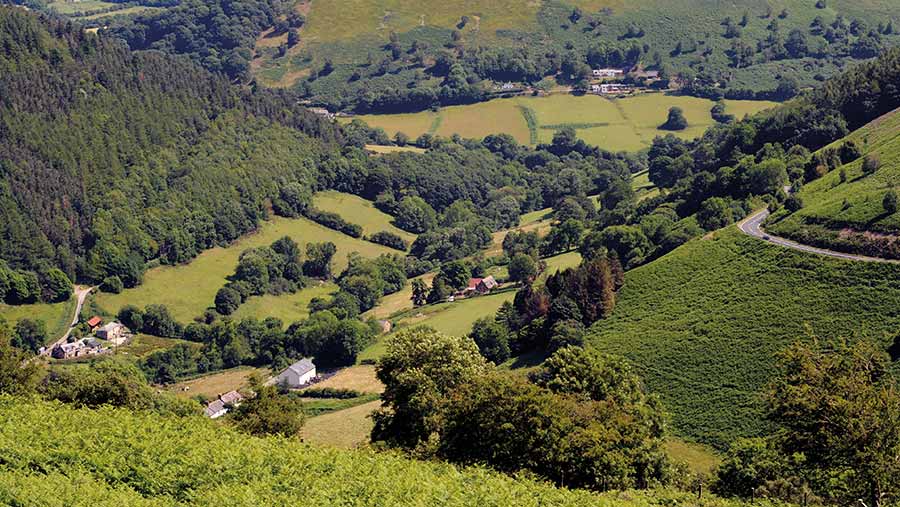New Welsh farm support scheme majors on tree planting
 © Harvey Hudson/Adobe Stock
© Harvey Hudson/Adobe Stock Farmers in Wales will need to have at least 10% of their land planted with trees if they want a baseline payment from the new Sustainable Farming Scheme (SFS).
Details of the Welsh government’s proposals for the new scheme, announced on Wednesday (6 July), reveal a three-tier system of options and payments under the headings Universal, Optional and Collaborative.
See also: Welsh farm support scheme to target climate change from 2025
The Universal tier is a mandatory one, with 12 actions that every farmer who applies to the SFS must comply with to receive cash, paid at a flat rate per hectare.
One of these is tree cover – a minimum of 10% on every farm but including existing trees.
In a document outlining its proposals, the government seeks to reassure farmers on this.
“Although this may sound like an approach which will require a major shift in farm management, we want to support farmers to plant more hedges, shelter belts and trees in field corners, as well as establishing woodland at field scale on land which has low agricultural and habitat value,” it says.
Habitats on at least 10% of the farm will also need to be managed and enhanced, or new ones created to achieve that figure.
Three-tier approach
Universal tier – mandatory
- Complete an annual KPI self-assessment
- Set up dedicated secure stores for deadstock
- Operate pest control programmes
- Report the average amount of antibiotics used on the farm
- Manage peatland appropriately
- Create habitat features on land if 10% of the farm doesn’t currently have these
- Restore and manage wildlife ponds or create shallow temporary ponds
Optional tier
- Establish a mixed sward of grasses, legumes and herbs or native wildflowers
- Capital support for rotational and mob grazing infrastructure
- Decarbonise machinery use and farming practices
- Use minimum-tillage or no-tillage methods to cultivate crops
Collaborative tier
- Improve water quality in a catchment
- Establish producer organisations or co-operatives
Benchmarking
There will be compulsory benchmarking with a set of sector-specific and industry-level Key Performance Indicators (KPIs), which the government is confident will lead to a “step change” in farm performance.
Bare fields over the winter will be banned, as multispecies cover crops will have to be grown on all uncropped land.
Biosecurity also features, with compulsory wash stations and secure feed stores required.
Every farm will need to have a programme of regular soil testing and to record and report its pesticide use.
In setting out its proposals, the government says it understands that some farms may not be able to deliver the full range of Universal actions from the outset, because of farm type, topography or land management contracts.
“Exemptions may therefore be in place, but our starting position is that farms in the scheme should undertake all Universal actions,” it says.
Optional extras
For farmers who want to bump up their payments, there are a series of targeted actions set out in the Optional tier.
These include mob grazing, covering slurry stores, drying poultry manure, and growing crops that reduce a farm’s reliance on bought-in feed.
Farmers could also be paid for having a three-metre-wide fence and hedge along the farm boundary to prevent contact with neighbouring stock, and for committing to isolate all incoming animals for at least six days.
The Collaborative actions are targeted at groups of farmers working together to deliver “public goods” at a landscape, catchment or national scale – such as improving water quality.
Sustainable
The government insists the actions set out in the Universal tier will help farms become more sustainable. It also suggests that they should be “within reach of most farmers” and can be integrated into current farming practice.
“The scheme is designed so all farm types can access it, including tenants and those with rights to common land,” it says.
The government plans to retain its flagship Farming Connect programme to deliver training and knowledge sharing.
As for the payment rates, farmers will have to wait until the final scheme goes out for consultation in 2023, but the government suggests they will provide a “fair and stable income”.
Payments could be capped, though, to “ensure that funding is distributed in a fair way”.
The government will now embark on the second phase of the SFS co-design.
Supporting farmers during BPS phase-out
The Welsh government says it wants to avoid farm businesses suffering a funding “cliff edge’’ when the Basic Payment Scheme (BPS) and Glastir payments are phased out.
Farmers will therefore receive a stability payment from 1 April 2025 to 31 March 2029.
The government says:
“Whilst we do not have budget certainty beyond the financial year 2024-25, and transition planning will be subject to future funding settlements, we will continue to support farmers throughout the transition period and as we phase out BPS.”
